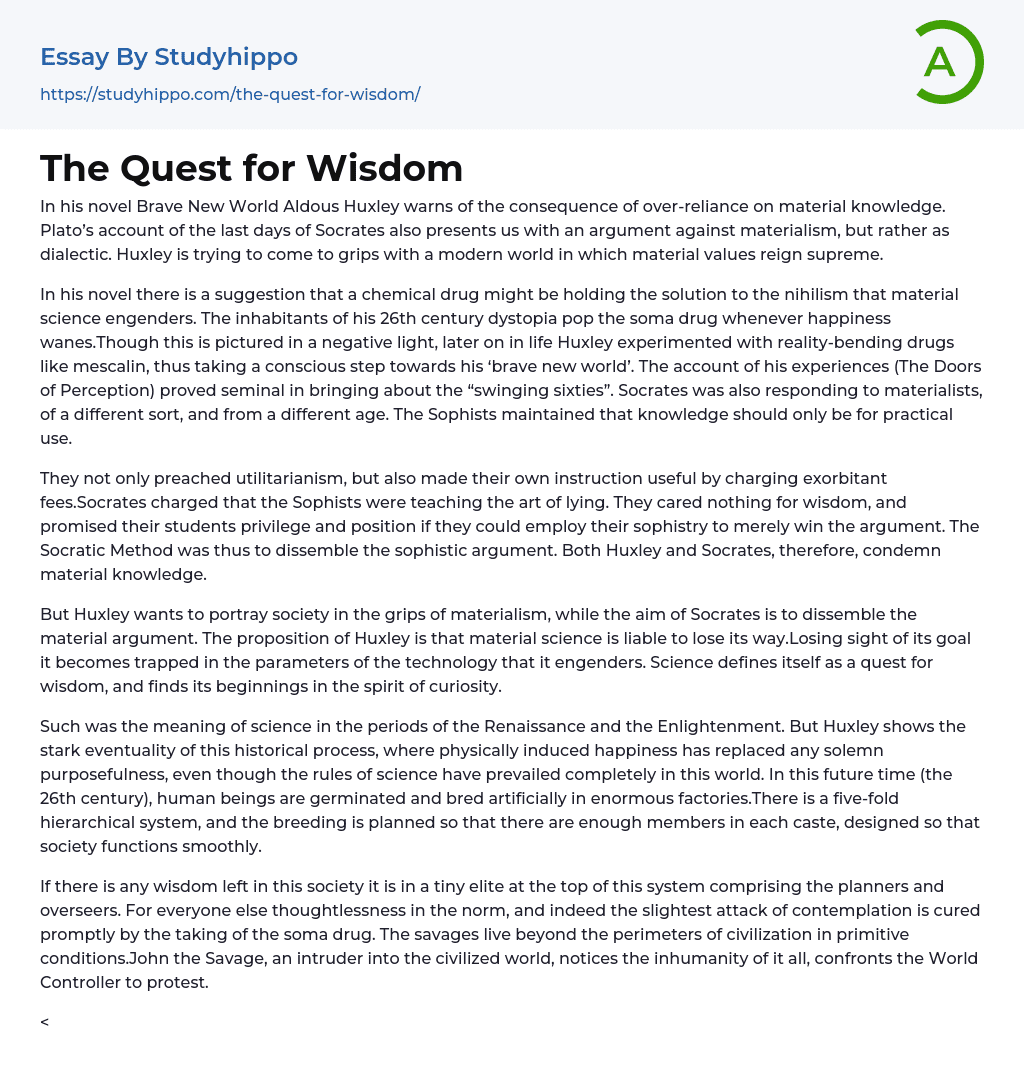Aldous Huxley's Brave New World novel cautions against excessive dependence on material knowledge, while Plato's portrayal of Socrates' final days presents an argument against materialism through dialectic. Huxley grapples with a contemporary society where material values hold ultimate sway.
The novel suggests that a chemical drug may hold the answer to the nihilism caused by material science in the 26th century dystopia. The inhabitants turn to the soma drug when their happiness diminishes. Even though this is portrayed negatively, Huxley later experimented with reality-altering drugs such as mescaline, purposefully moving towards his “brave new world”. In his account of these experiences (The Doors of Perception), Huxley influenced the countercultural movement of the “swinging sixties”. Socrates also responded to materialists of a different age - the Sophists argued that knowledge should only be practical.
B
...oth Huxley and Socrates denounce the teaching methods of the Sophists, who not only preached utilitarianism but also charged excessively high fees. Socrates accused them of instructing students in the art of lying, as they cared little for true wisdom and instead promised success and status to those who could merely win an argument using their sophistry. The Socratic Method sought to expose and break down such fallacious arguments. Ultimately, both philosophers reject the prioritization of material knowledge.
While Huxley and Socrates hold different views on society's connection to materialism, they both explore this topic. Huxley portrays a world consumed by materialism, while Socrates aims to dismantle this idea. According to Huxley, the danger lies in material science losing its direction and being confined by its own technological advancements. Conversely, science is commonly viewed as a pursuit of knowledge founded on curiosity and
wisdom.
During the Renaissance and Enlightenment, science held a different significance compared to the present time depicted by Huxley. The author portrays a stark outcome of this historical evolution; where physical pleasure becomes paramount at the expense of all other meaningful goals, all while science reigns supreme. In this future era (the 26th century), individuals are artificially produced in massive factories, according to a carefully devised five-tier system that ensures adequate population for each social class and smooth functioning of society.
Within this society, wisdom resides only in a select few at the system's apex who serve as planners and overseers. The majority of the population live thoughtlessly, resorting to soma drug should they experience any contemplation. The savage community dwells beyond the civilization limits, remaining in their primitive state. Upon infiltrating the civilized world, John the Savage witnesses its inhumanity and directly confronts the World Controller in protest.
Controller calmly explains in Huxley's 1932 book (p. 264) that stability comes at a cost. The logical progression of science has led to the belief that human instincts lead to instability and violence, so instead, a mechanized and inhumane approach has been chosen. In contrast, Socrates aimed for spiritual wisdom and dismissed materialism as futile and numbing. Plato's portrayal of Socrates' teachings in The Last Days of Socrates is deeply insightful.
In Plato's narrative, Socrates' final moments are recounted where he was condemned to death on charges of corrupting the youth in Athens. Nevertheless, Socrates remains steadfast and composed while providing his gathered friends with invaluable insights. His eloquence allows him to debate with his prosecutors and showcase his composure, leading up to his renowned declaration that "a
good man cannot be harmed, either in life or after death" (Plato 2003, p.70).
The key observation is that Socrates is prepared for death, whereas the inhabitants of Brave New World resist death by desperately holding on to material senses. In their final moments, they are mentally dismantled in insane asylums and then put to sleep with drugs. To Socrates, material knowledge functions merely as a tool for recollection. It allows us to recall the genuine knowledge that our souls possessed prior to birth. If we achieve some semblance of recollection, we are ready to depart this world, abandoning the flawed mortal coil and reclaiming the pristine wisdom of our souls.
Although their emphases differ, the core message in both books is the same. Brave New World portrays the terrifying victory of material knowledge, while Plato's writings present the magnificent argument opposing materialism and advocating for spiritual wisdom. Socrates' reasoning renders Plato's approach superior since it is more challenging to portray truth than to expose falsehoods.
- Animals essays
- Charles Darwin essays
- Agriculture essays
- Archaeology essays
- Moon essays
- Space Exploration essays
- Sun essays
- Universe essays
- Birds essays
- Horse essays
- Bear essays
- Butterfly essays
- Cat essays
- Dolphin essays
- Monkey essays
- Tiger essays
- Whale essays
- Lion essays
- Elephant essays
- Mythology essays
- Time Travel essays
- Discovery essays
- Thomas Edison essays
- Linguistics essays
- Journal essays
- Chemistry essays
- Biology essays
- Physics essays
- Seismology essays
- Reaction Rate essays
- Roman Numerals essays
- Scientific Method essays
- Mineralogy essays
- Plate Tectonics essays
- Logic essays
- Genetics essays
- Albert einstein essays
- Stars essays
- Venus essays
- Mars essays
- Evolution essays
- Human Evolution essays
- Noam Chomsky essays
- Methodology essays
- Eli Whitney essays
- Fish essays
- Dinosaur essays
- Isaac Newton essays
- Progress essays
- Scientist essays




